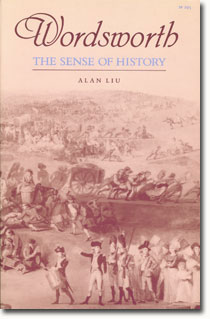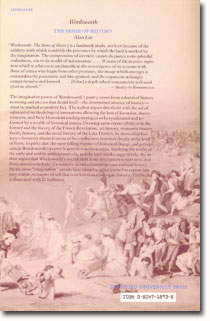| 2006 |
Wordsworth: The Sense of History
Categories |
Stanford Univ. Press, 1989 , 726 pp., ISBN-10: 0804718938, ISBN-13: 978-0804718936

[Catalog copy: original description on hardcover jacket]
The imaginative power of Wordsworth’s poetry stems from a denial of history so strong and precise that denial itself—the determined absence of history—must be studied as positive fact. The author argues this thesis with the aid of substantial methodological innovations allowing the best of formalist, deconstructive, and New Historicist reading strategies to be synthesized and informd by a wealth of historical matter. Drawing upon recent advances in the history and theory of the French Revolution, art history, economic history, family history, and the social history of the Lake District, he shows that history—however absent it seems to be—influences literature deeply at the level of form. In particular, the most telling register of historical change and perception in Wordsworth’s poetry is generic transformation. Studying the works of the early and middle years intensively, and the later works suggestively, the author argues that Wordsworth’s overall shift from description to narrative, and from narrative to lyric, is a mimetic denail of contemporary cultural history. By the time “imagination” invests lyric imagery, it has learned to capture history within an empire of self that is no less than a surrogate history, a facsimile ideology.
Part One of the book introduces the subject by rereading the Simplon Pass episode in The Prelude as a denial of Napoleon’s Alpine crossing of 1800. It then formulates a methodology of historical reading by witnessing in the modern and postmodern notion of “context” a developing collaboration between formalist and materialist perspectives. The “matter” of history, the author argues, is collectively structured, witnessed, and uttered absence; and the reading of history is therefore a discrimination of forms of absence. When a city or a cottage is effaced, there is left only the nothing that is the constitutive basis of conventions of difference—of hate, prejudicial discrimination, “nation,” “culture,” and, as one of the most discriminating of cultural discriminations, the differential forms of art.
Part Two draws upon art history, political history, contemporary journalism, and narrative theory to study the formal collision between Wordsworth’s early picturesque and the predominantly narrative mode of French Revolutionary violence. Out of this collision, “time” arose as the massive denial of history, giving the poet his first authority separate from the “People.” In chapters entitled “The Tragedy of the Family,” “The Economy of Lyric,” and “A Transformed Revolution,” Part Three traces the development of authority into the “originality” of the poet’s mature ideology of autobiography. Part Four concludes the work by pointing ahead in Wordsworth’s corpus toward “The Idea of the Memorial Tour” and the self-critical stance of a poet whose quintessential act was to “collect” himself. The book ends with a brief epilogue on history and critical self-consciousness.
[Jacket Illustration: La Journée des Brouettes (or Préparatifs de la Fête de las Fédération au Champ de Mars, Juileet 1790) by Etienne-charles Le Guay. Musée Carnavalet]

|
Part I. Introduction
Part II. Violence and Time: A Study in Poetic Emergence Before Time
Part III. The Flight of Forms: A Study of Poetic Individuation Lyric and Empire
Part IV. Conclusion
Epilogue Appendix |


